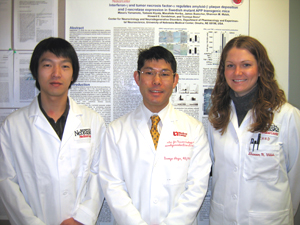 |
Tsuneya Ikezu, M.D., Ph.D., center, with his research team, research fellow Tomomi Kiyota, Ph.D., left, and confocal manager Shannon Walsh. The team recently made an important discovery concerning the cause of Alzheimer’s disease. |
UNMC researcher, Tsuneya Ikezu, M.D., Ph.D., is trying to do just that in the case of Alzheimer’s disease.
In an article published this month in “The American Journal of Pathology,” Dr. Ikezu and his team explain how the inflammatory response generated from the immune cells of the brain, also known as microglia and astrocytes, affect clearance of amyloid plaques. Such plaques are linked to mental deterioration in Alzheimer’s disease.
Dr. Ikezu has found that when signaling between the microglia and astrocytes is disrupted, inflammation of the brain also is slowed down.
“These are important findings that are able to link inflammation to the progression of Alzheimer’s disease,” Dr. Ikezu said. “Although this is just one of the mechanisms that cause this horrific disease, it is a very important one.”
When the microglia and astrocytes cells that surround the amyloid plaques in the brain are over stimulated they produce pro-inflammatory cytokines, Dr. Ikezu said.
The inflammation caused by the cytokines affects neuronal functioning, which leads to degeneration of nerve cells.
The next step in Dr. Ikezu’s research is to find a way to stop the activation of the astrocytes and microglia, thus reducing amyloid accumulation and potentially slowing down the progression of Alzheimer’s disease.
Dr. Ikezu’s study was done using two sets of mice, a control group and a Swedish mutant amyloid precursor protein (APP) transgenic type of mouse in which the interferon-gamma receptor was knocked out silencing the major pro-inflammatory cytokine signal.
In comparison, Dr. Ikezu discovered that when the interferon-gamma receptor is knocked out, it also prevents the ability of the astrocytes and microglia cells from producing a key pro-inflammatory cytokine TNF-alpha (tumor necrosis factor-alpha), which promotes amyloid deposition in the brain.
“Our theory is that the TNF inhibitor might be able to stop the activation of the astrocytes and microglia, reduce amyloid accumulation, and potentially slow down the progression of the disease,” Dr. Ikezu said.
The findings developed in this study demonstrate the importance of inflammatory responses in the progressive nature of Alzheimer’s disease. These works not only are very novel in approach but signal a unique path to track the disease and to develop novel therapies for mental deterioration, said Howard Gendelman, M.D., professor and chairman of the department of pharmacology and experimental neuroscience at UNMC.
“No question this is one important step toward someday finding a ‘true’ cure for this devastating disease,” Dr. Ikezu said.